NY Should Allow Trafficking Survivors To Clear Criminal Records
October 1, 2019
A good prostitution-related bill that passed the Assembly side of the NY legislature in June is still pending in the state Senate. This legislation — known on the Senate side as S981A — would fully vacate the criminal convictions of human-trafficking victims.
In 2010, NY became the first state to enact a law that allows human-trafficking victims to vacate certain criminal convictions related to sex work. This law was a good first step, but it didn’t go far enough to protect the rights and safety of trafficked individuals. While the 2010 law recognizes the social, psychological, and financial consequences of labeling victims as criminals, its scope is limited: The law allows only sex-related trafficking survivors to clear convictions — not consensual sex-work convictions, and not convictions for non-sexual forms of labor exploitation.
Human-trafficking victims are often arrested for offenses that extend beyond prostitution, such as drug possession, trespassing, or possession of a weapon. DSW General Counsel Melissa Broudo was featured in The New York Times in 2015 for her pioneering work in this field. Broudo contended that criminalization makes it more difficult for trafficking victims and consensual adult sex workers alike to build a life outside of the industry because of employment and housing discrimination. And convictions have especially severe consequences for non-citizens, because those convicted of prostitution-related offenses are often deported.
DSW enthusiastically supports the NY legislation, which was introduced by Jessica Ramos (D) on the Senate side. It’s vital to take a harm-reduction, human-rights approach when fighting for justice for trafficking survivors.
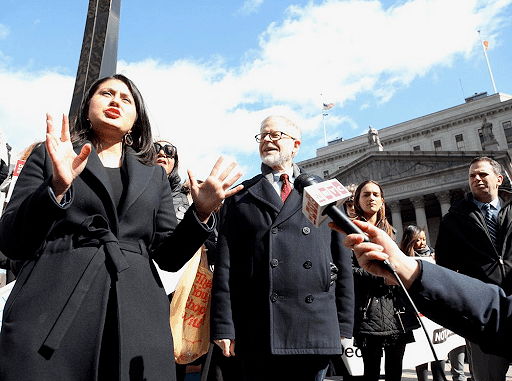
Sen. Jessica Ramos (D) and Assembly Member Richard Gottfried (D) speak about the bill they are co-sponsoring in Albany. (Photo: Danielle Blunt/Queens Eagle)
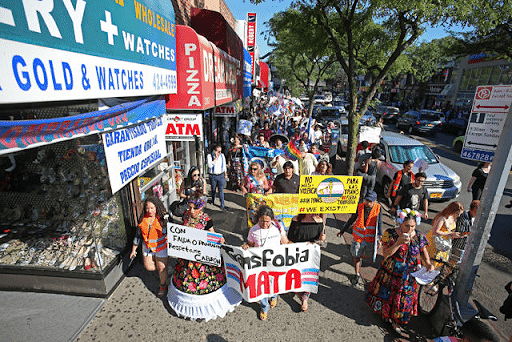
Demonstrators march in support of vacatur legislation in Jackson Heights, July 2018. (Photo: Andy Katz/Brooklyn Eagle)
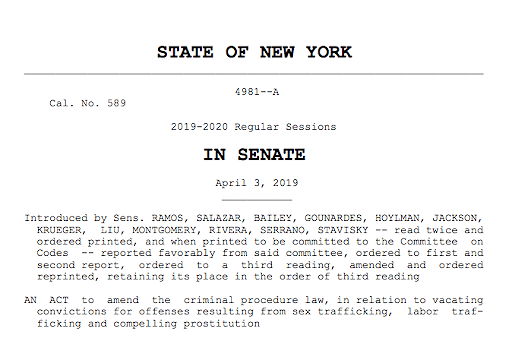
The bill, as proposed in April (via NYSenate.org)
DSW Newsletter #7 (October 2019)
Twenty Years Later, Data Show That the Swedish Model Harms Sex Workers
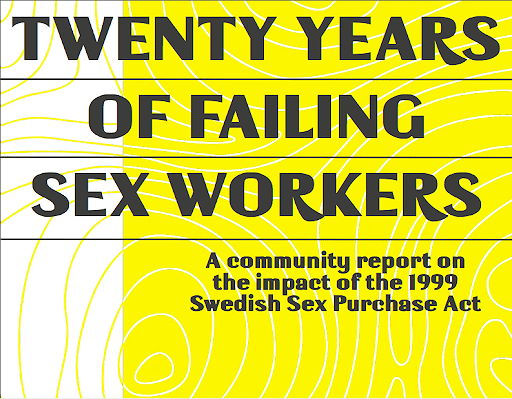
NY Should Allow Trafficking Survivors To Clear Criminal Records

DSW Joins Community Organizers at a Trans/Sex Workers Rights Mixer

“End Demand” Doesn’t Work in Ireland

DSW in the News

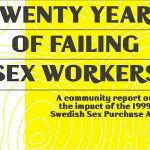 Twenty Years Later, Data Show That...
Twenty Years Later, Data Show That...
 NY Should Allow Trafficking Survivors To...
NY Should Allow Trafficking Survivors To...
 DSW Joins Community Organizers at a...
DSW Joins Community Organizers at a...
 “End Demand” Doesn’t Work in Ireland
“End Demand” Doesn’t Work in Ireland
 DSW in the News
DSW in the News
DSW Newsletter Archive
Twenty Years Later, Data Show That the Swedish Model Harms Sex Workers
September 29/30, 2019
Twenty years after Sweden passed the Sex Purchase Act of 1999, the country hosted “Sex Work, Human Rights, and Health: Assessing 20 Years of the Swedish Model” in Stockholm. The conference brought together activists, researchers, and policymakers from around the world to discuss the impact of the 1999 law, which criminalized the purchase of sex (arresting clients) while permitting the sale of sex (not arresting sex workers).
According to a report released by the organizers of the conference, Sweden’s law has “contributed to [the] increasing stigmatization and vulnerability of women, and people of all genders, contradicting the proclaimed feminist-humanitarian principles of the lawmakers.”
Fuckforbundet, a sex-worker rights organization founded by and for sex workers, organized the conference and published the report “Twenty Years of Failing Sex Workers: A community report on the impact of the 1999 Swedish Sex Purchase Act.”
The report explains how sex workers’ living and working conditions have deteriorated since 1999 because of the Swedish government’s “widespread systematic attempts to eradicate the sex industry.” Rather than empowering women, the Swedish model increases the stigmatization and vulnerability of workers in a criminalized industry. This criminalization is particularly dangerous for immigrants and women of color.
Before the conference concluded, hundreds of activists marched through Stockholm’s streets to demand that the Swedish government protect sex workers. Protesters explained to reporters from PinkNews UK that criminalizing clients contributes to the stigmatization of those in the sex industry.
Notably, the Swedish government has yet to a systematic evaluation of the law. Despite this lack of research, the policy has spread to other countries, including Norway, Iceland, Finland, Canada, and Northern Ireland.
In 2014, a study commissioned by the Norwegian government concluded that sex workers in Norway today suffer from diminished bargaining power and increased safety concerns, instead relying more on abusive third parties.†
The results from Norway prompted Amnesty International to conduct its 2016 study of sex-worker rights, which recommended the full decriminalization of sex work in order to “respect, protect, and fulfill the human rights of sex workers.” These findings have been backed up by scholars of multiple disciplines, whose work can be found on the “resources” page of DSW’s web site.
†Bjørndahl, U. (2012). Dangerous Liaisons. A report on the violence women in prostitution in Oslo are exposed to.

Marchers carry red umbrellas, the international symbol of sex workers’ rights, at the Stockholm demonstration. (Photo: Twitter/SWARM)
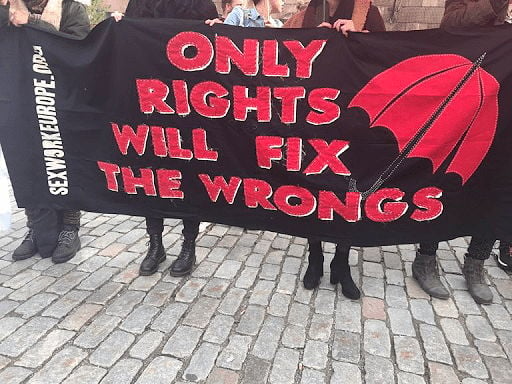
The sex workers’ rights movement wants sex work decriminalized globally. (Photo: Twitter/SWARM)

The cover page of the report by Fuckforbundet
DSW Newsletter #7 (October 2019)
Twenty Years Later, Data Show That the Swedish Model Harms Sex Workers

NY Should Allow Trafficking Survivors To Clear Criminal Records

DSW Joins Community Organizers at a Trans/Sex Workers Rights Mixer

“End Demand” Doesn’t Work in Ireland

DSW in the News

 Twenty Years Later, Data Show That...
Twenty Years Later, Data Show That...
 NY Should Allow Trafficking Survivors To...
NY Should Allow Trafficking Survivors To...
 DSW Joins Community Organizers at a...
DSW Joins Community Organizers at a...
 “End Demand” Doesn’t Work in Ireland
“End Demand” Doesn’t Work in Ireland
 DSW in the News
DSW in the News
DSW Newsletter Archive
DSW Supports the Fight Against FOSTA in U.S. Court of Appeals
September 20, 2019
Earlier this year, DSW filed an amicus brief in support of the lawsuit brought against the U.S. government by the Woodhull Freedom Foundation (WFF), Human Rights Watch, The Internet Archive, and two other plaintiffs in reaction to the terrible federal law known as the “Fight Online Sex Trafficking Act” (FOSTA). FOSTA chills speech and harms sex workers. It makes it harder for people to protect themselves from violence and personal risk and violates constitutional rights protected by the First Amendment.
The court wrongly dismissed the lawsuit, but the plaintiffs appealed. After a year of fighting for the case to be heard, DSW and our plaintiff allies finally got our day in court: On September 20, attorneys for WFF and the other plaintiffs addressed a panel of three appellate judges. They asked the court to issue a preliminary injunction to halt the future enforcement of FOSTA, meaning that ideally, people would no longer be arrested.
Kaytlin Bailey attended the hearing on September 20. No decision has been issued at this time, and it may take months for the appellate court to rule. WFF was joined by fellow plaintiffs from SWOP Behind Bars, related organizations, and brave individuals who put their reputations and livelihoods on the line by articulating for the courts how FOSTA/SESTA has impacted them. The current position of the federal government is that issues of free speech, sex worker safety, and trafficking are not impacted by FOSTA/SESTA — and that the law simply disrupts trafficking without endangering individual rights or safety.
After the oral arguments attorneys, plaintiffs, and advocates, including Bailey, gathered for a debriefing. Learn more about the case in a Peepshow Podcast interview with Ricci Levy. Our coalition is waiting for the judges’ decision. No matter the outcome, we will continue to fight this transparently unconstitutional law.

DSW’s Kaytlin Bailey is pictured with Ricci Levy, WFF’s CEO, president and former executive director, named the lead plaintiff in the Woodhull v. USA case, as well as the team from Davis Wright Tremain Law Firm, litigating the suit. (L to R: Larry Walter, Ricci Levy, Robert Corn-Revere, Kaytlin Bailey and Ronald G London; Photo: DSW, 2019)
DSW Newsletter #6 (September 2019)
DSW Attends International Human Trafficking and Social Justice Conference

DSW Supports the Fight Against FOSTA in U.S. Court of Appeals

Historic Prison Reform in NYC
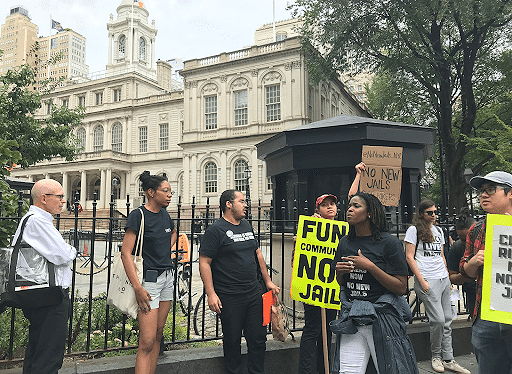
Could Britain Be Next?
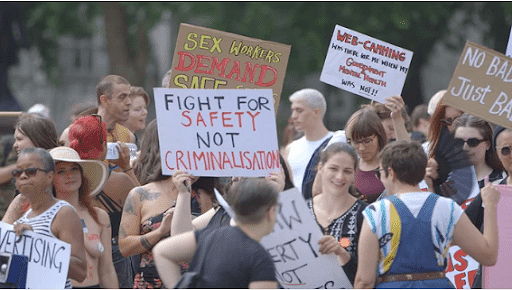
Dancers Unite! Historic Legislation on Stripper Labor Rights Passed in Minneapolis
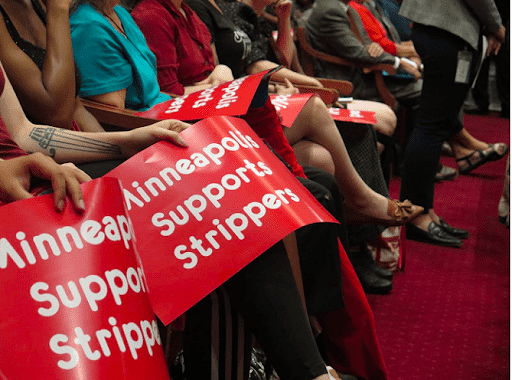
 DSW Attends International Human Trafficking and...
DSW Attends International Human Trafficking and...
 DSW Supports the Fight Against FOSTA...
DSW Supports the Fight Against FOSTA...
 Historic Prison Reform in NYC
Historic Prison Reform in NYC
 Could Britain Be Next?
Could Britain Be Next?
 Dancers Unite! Historic Legislation on Stripper...
Dancers Unite! Historic Legislation on Stripper...
DSW Newsletter Archive
“End Demand” Doesn’t Work in Ireland
September 18, 2019
The Human Trafficking and Exploitations Act of 2015, mimicking Sweden’s end demand model, criminalized the purchase of sex rather than the sale of commercial sex in Northern Ireland. The hope was that targeting demand would cut back on trafficking. After years of aggressive implementation, the policy has failed to achieve any of its stated goals.
Sex workers know that criminalizing any part of their work will force them into unsafe and unstable work environments and limit their ability to negotiate. Three years after its implementation, the effects of the law were investigated by a research commission from Queens University Belfast. It was clear that this model neither diminishes trafficking nor supports the health and safety of workers. The findings of the independent review were presented by the UK Department of Justice on September 18.
The key findings of the study show that:
* The law has had little effect on the demand for sexual services. Sex workers reported a surge in business in the period following its introduction.
* Based on the premise that criminalization would end demand for commercial sexual services, there should have been a greater “tailing off” of sex worker advertising during the period following implementation. This has not occurred. Instead, there has been a 5% increase in the number of sex work advertisements since the law passed.
* Between 2015 and 2018, there has been an increase in the number of reports of violent crimes committed against sex workers on the Uglymugs.ie website. Assaults increased from 3 to 13, sexual assaults have gone from 1 to 13, and threatening behavior increased from 10 to 42.
* Sex workers have also been victims of higher rates of anti-social and nuisance behavior and reported higher levels of anxiety and unease.
* Only 11% of clients said that the law would cause them to stop purchasing sex, and 76% of those surveyed felt that it had no impact on the ease with which they purchase sex.
The data suggests that end demand policies are correlated with an increase in abusive behavior and violence directed at sex workers. This contributes to increased feelings of marginalization; it makes workers less likely to report violence and even more vulnerable to abuse by police. Lastly, the goal of eradicating trafficking has gone unrealized. The law has not affected the rate of human trafficking for sexual exploitation.
The Nordic Model has been erroneously heralded as the moral gold standard in combatting sex trafficking across the globe. Advocates for the Nordic Model aren’t listening to sex workers; they prefer to think of them as helpless, voiceless victims. Help DSW fight to end trafficking and promote health and safety for sex workers by decriminalizing sex work.
Decriminalization works. Let’s fight for it.

Katie McGrew and Dearbhla Ryan of Sex Workers Alliance Ireland are pictured at a candlelit vigil to end violence against sex workers. (Photo: Fergal Phillips/The Independent)
DSW Newsletter #7 (October 2019)
Twenty Years Later, Data Show That the Swedish Model Harms Sex Workers

NY Should Allow Trafficking Survivors To Clear Criminal Records

DSW Joins Community Organizers at a Trans/Sex Workers Rights Mixer

“End Demand” Doesn’t Work in Ireland

DSW in the News

 Twenty Years Later, Data Show That...
Twenty Years Later, Data Show That...
 NY Should Allow Trafficking Survivors To...
NY Should Allow Trafficking Survivors To...
 DSW Joins Community Organizers at a...
DSW Joins Community Organizers at a...
 “End Demand” Doesn’t Work in Ireland
“End Demand” Doesn’t Work in Ireland
 DSW in the News
DSW in the News
DSW Newsletter Archive
Woodhull and Other Plaintiffs Deliver Their Oral Arguments to the U.S. Court of Appeals
September 18, 2019:
Woodhull and other plaintiffs deliver their oral arguments to the U.S. Court of Appeals.
Could Britain Be Next?
August 26, 2019
What we can learn from public support of full decriminalization in the United Kingdom
There is renewed debate among Members of Parliament, unions, and human rights and anti-trafficking groups concerning sex work policy reforms. A study conducted by RightsInfo, a U.K. Human Rights Advocacy Organization, found recently that 49% of the British public would support decriminalization legislation. As the law stands, buying and selling sex among adults is not a crime in the U.K.—but the law does prohibit public solicitation, owning or managing brothels, or any organization between sex workers.
Fiona Bruce, Conservative MP and chair of the Conservative Party’s Human Rights Commission, announced in July that she intended to table a bill that had been proposed. The bill would have amended the “complex, confusing and inconsistently applied” laws on sex work in the U.K. But current U.K. law is out of step with public opinion. Niki Adams of the English Collective of Prostitutes, a group that is dedicated to advocating for decriminalization, reports that the public is “horrified that sex workers suffer so much violence and understand that the prostitution laws, which force women to work in isolation,” increase the dangers that they face from clients, pimps, and others. In 2015, a poll conducted by YouGov found that 54% percent of the public would support full decriminalization provided it were consensual. The latest poll reinforces these findings, gauging more specific support for the decriminalization of “brothel-keeping” (49% in favor) and street prostitution (44% in favor).
Professor Teela Sanders, criminology expert at the University of Leicester, criticizes sex work laws in the U.K. that do not reflect the “more liberal attitudes towards sexuality” reflected by popular surveys. She suggests that “if politicians were brave enough to think about the impracticalities of current laws and how damaging they are, then there would not be a backlash.” Currently, about 72,800 sex workers live in the U.K. Laws “prevent sex workers from working together in safety … criminalizing vulnerable women [which] contributes to the underreporting of a wide range of crimes committed against sex workers and other community members,” says Dr. Rosie Campbell, OBE, from York University. In the last three years, there have been 186 prosecutions and 177 convictions for brothel-keeping, 54% of which were against women. In the same period, there were 915 prosecutions and 814 convictions for street solicitation. The majority of these convictions targeted women.
The U.K. example makes it clear that sex work law affects us all. Decriminalization is an intersectional issue that touches on body autonomy, workers’ rights, gender and racial equality, and public health. The role of government is to protect the rights, health, and safety of individuals and communities, not to criminalize and endanger consenting adults with false moral claims; popular opinion recognizes this. In the U.S., we have a long way to go. But we can look to the positive changes in places like New Zealand, and even the U.K., who have taken steps towards decriminalization, for our path forward.

Activists from the English Collective of Prostitutes demonstrate against legislation that coerces women into working alone in their Make All Women Safe campaign. (Photo: Jake Hall/Vice UK, 2019)
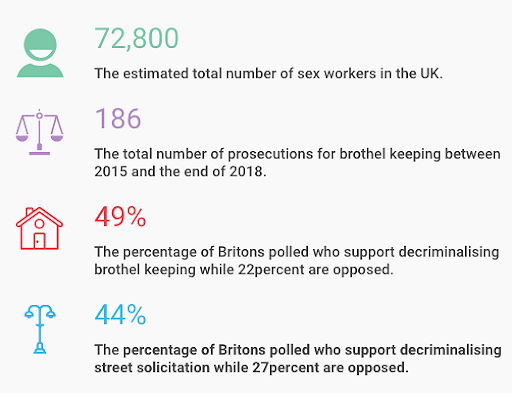
Statistics on sex worker and public opinion in the U.K. (Image: RightsInfo.org, 2019)
DSW Newsletter #6 (September 2019)
DSW Attends International Human Trafficking and Social Justice Conference

DSW Supports the Fight Against FOSTA in U.S. Court of Appeals

Historic Prison Reform in NYC

Could Britain Be Next?

Dancers Unite! Historic Legislation on Stripper Labor Rights Passed in Minneapolis

 DSW Attends International Human Trafficking and...
DSW Attends International Human Trafficking and...
 DSW Supports the Fight Against FOSTA...
DSW Supports the Fight Against FOSTA...
 Historic Prison Reform in NYC
Historic Prison Reform in NYC
 Could Britain Be Next?
Could Britain Be Next?
 Dancers Unite! Historic Legislation on Stripper...
Dancers Unite! Historic Legislation on Stripper...
DSW Newsletter Archive
Dancers Unite! Historic Legislation on Stripper Labor Rights Passed in Minneapolis
August 23, 2019
The Minneapolis City Council unanimously passed a historic ordinance that has increased the labor rights of strippers in the city. The law now includes, but is not limited to: banning management from extorting tips from dancers, mandating contracts provided by dancers, requiring sexual harassment training for management, and preventing management and security with a history of domestic violence from working in clubs. The legislation is the first of its kind to be passed in the United States.
In 2017, the city’s health department launched an investigation into Minneapolis strip clubs, reporting unsanitary conditions in many downtown locations. Simultaneously, reports authored by the University of Minnesota and Minnesota State University at Mankato found that many workers had concerns about safety in clubs, particularly in one-on-one customer interactions. Early proposals by the council included banning VIP rooms and requiring all performers to be club employees. Councilmember Cam Gordon reached out to entertainers and found that “those were two things they absolutely wanted preserved, for very good reasons.”
Dancers organized and called for their rights. Using participatory action research, Sex Workers Outreach Project (SWOP) Minneapolis and a research team at MSU conducted a needs assessment to understand the experiences and perspectives of workers in strip clubs. They identified prominent themes to protect dancers from exploitation and improve safety and health measures for everyone. The coalition presented to the city council and the health department on August 12, and the ordinance was approved on August 23.
The ordinance’s passage is a huge step in prioritizing labor rights of sex workers, and DSW is excited about its implications for the country as a whole. In a Minnesota Public News article, Jane Swyft of SWOP describes how stigma and dehumanization affect even legal sex workers: “When erotic dance is treated as a public embarrassment, workers find very little help in their struggles with an exploitative pay structure, racist management or harassment.” Many dancers may still choose to share tips with management and security, but this bill prevents it from being compulsory.
Congratulations to the beautiful community of sex workers and allies in Minneapolis, showing the world that grassroots activism works.

Activists, including dancers and allies, show their support for the ordinance in the Minneapolis City Council’s chambers at the public hearing on August 12. (Photo: Matt Sepic/MPR News, 2019)
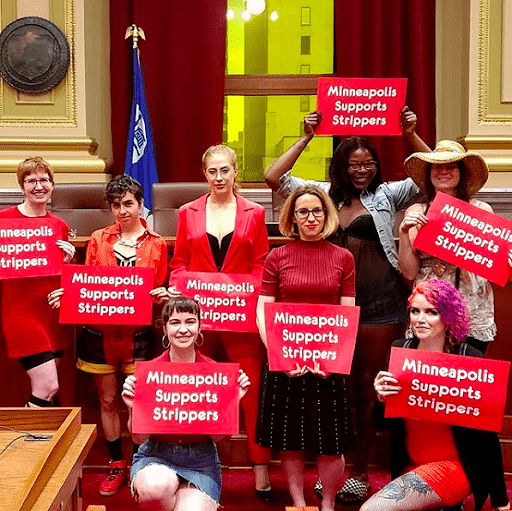
Dancers and allies show their support after the passage of the bill on August 23. Strippers in Minneapolis will now have access to unprecedented labor rights to protect their health and safety in clubs, relationships with clients and management. (Photo: We Are Dancers USA, 2019)
DSW Newsletter #6 (September 2019)
DSW Attends International Human Trafficking and Social Justice Conference

DSW Supports the Fight Against FOSTA in U.S. Court of Appeals

Historic Prison Reform in NYC

Could Britain Be Next?

Dancers Unite! Historic Legislation on Stripper Labor Rights Passed in Minneapolis

 DSW Attends International Human Trafficking and...
DSW Attends International Human Trafficking and...
 DSW Supports the Fight Against FOSTA...
DSW Supports the Fight Against FOSTA...
 Historic Prison Reform in NYC
Historic Prison Reform in NYC
 Could Britain Be Next?
Could Britain Be Next?
 Dancers Unite! Historic Legislation on Stripper...
Dancers Unite! Historic Legislation on Stripper...
DSW Newsletter Archive
DSW Supports the Continued Legal Fight Against FOSTA/SESTA
August 23, 2019
Next month, the D.C. Circuit Court of Appeals will hear the appeal of Woodhull Freedom Foundation et al v. The United States of America, a case that seeks to challenge the constitutionality of the Fighting Online Sex Trafficking Act (FOSTA). FOSTA modified the Communications Decency Act Section 230 to permit civil and criminal suits against third-party platforms/websites that promote or permit prostitution or trafficking. DSW, along with many other sex workers’ rights, civil liberties, and human rights organizations vehemently oppose this law. Woodhull Freedom Foundation’s initial challenge to FOSTA was denied in U.S. District Court in 2018 on the grounds of standing, and they have since filed this appeal. DSW General Counsel Melissa Broudo co-authored an amicus brief on behalf of a dozen allied organizations in support of Woodhull’s challenge to the law back in February of this year.
Plaintiffs are asking the court to issue a preliminary injunction and put a halt to future enforcement of FOSTA, meaning no one could be arrested and charged until the case is decided. The chilling effect is undeniable and has already threatened the livelihood of sex workers and pushed many to work in less safe conditions. This is a bad and dangerous law.
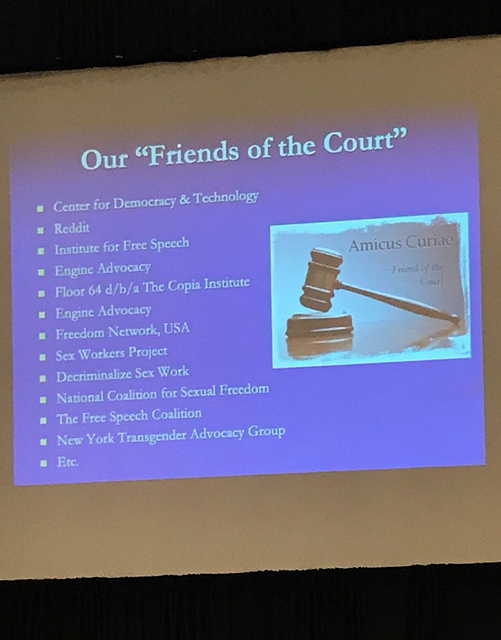
DSW General Counsel Melissa Broudo co-authored an amicus brief on behalf of a dozen allied organizations.
DSW Newsletter #5 (August 2019)
DSW Makes Its Case at National Conference of State Legislatures
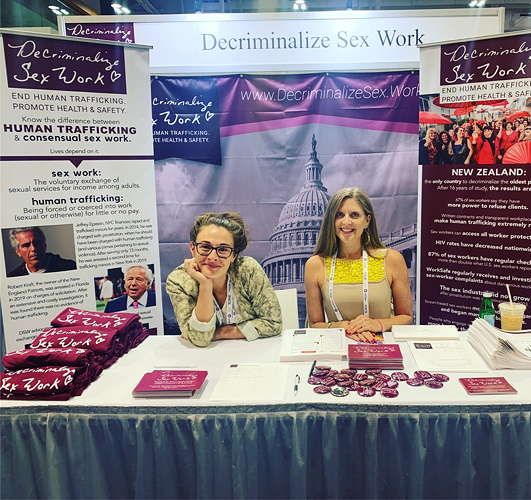
DSW Participates in Woodhull’s 2019 Sexual Freedom Summit

DSW Supports the Continued Legal Fight Against FOSTA/SESTA

Nevertheless She Existed: Kaytlin Bailey Presents a Sex Worker From History

Tiffany Cabán Concedes Queens DA Race

 DSW Makes Its Case at National...
DSW Makes Its Case at National...
 DSW Participates in Woodhull’s 2019 Sexual...
DSW Participates in Woodhull’s 2019 Sexual...
 DSW Supports the Continued Legal Fight...
DSW Supports the Continued Legal Fight...
 Nevertheless She Existed: Kaytlin Bailey Presents...
Nevertheless She Existed: Kaytlin Bailey Presents...
 Tiffany Cabán Concedes Queens DA Race
Tiffany Cabán Concedes Queens DA Race
